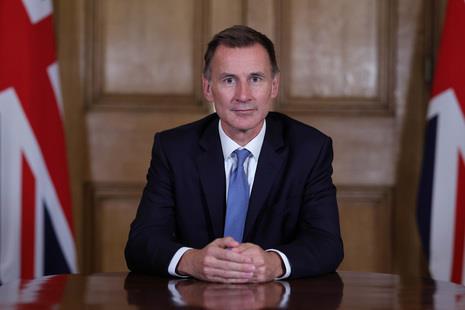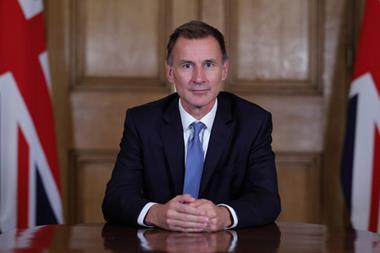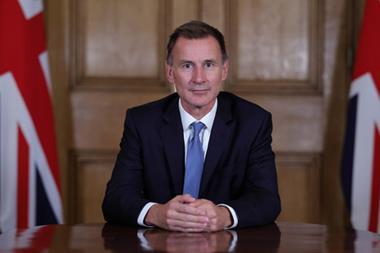The UK’s chancellor of the exchequer, Jeremy Hunt, announced additional reforms over the weekend as a further step in the government’s plan to boost UK business and increase returns for savers.
As part of the new reforms, defined contribution (DC) pension funds will be required to publicly disclose their level of investment in the UK.
The chancellor said the government’s automatic enrolment rollout has driven a “huge” growth in the amount of investment entering UK pension funds, from less than £90bn in 2012 to around £116bn in 2022.
However, the disclosure requirements for DC pension funds are currently inconsistent across the market and do not require a breakdown of UK investments, making it difficult for policymakers and savers to understand where this money is invested, the Treasury said.

It believes that ensuring pension funds publicly disclose where they invest and the returns they offer, it will make it possible for employers and savers to compare schemes and make informed choices regarding their planned retirement.
Under the Treasury’s plans, DC funds will disclose their level of investment in UK businesses, as well as their costs and net investment returns by 2027.
Pension funds will also be required to publicly compare their performance data against competitor schemes, including at least two schemes managing at least £10bn in assets.
The Treasury warned that schemes performing poorly for savers won’t be allowed to take on new business from employers, with The Pensions Regulator (TPR) and Financial Conduct Authority (FCA) having a full range of intervention powers.
The plans are subject to a consultation by the FCA and build on the government’s Mansion House Compact, which encourages pension funds to invest at least 5% of their assets in unlisted equity.
Hunt said: “We have already started on a path to drive growth, unlock capital for our most promising companies and improve outcomes for savers – and these new rules mean employers and savers can see how their money is invested and how the returns compare to other schemes.”
He said that UK pension funds appear to contribute less to the UK economy than their international counterparts, adding: “These requirements will help focus minds on how to improve overall returns and outcomes for savers.”
The reforms were welcomed by TPR’s chief executive officer Nausicaa Delfas.
She said: “Millions of people rely on a pension to support them in later life. That’s why it’s so important that we make sure all pension savers receive value for money.”
She noted that with more disclosure helping to spark competition between schemes, and enhanced powers to crack down on poor performers, pension funds can “really deliver for savers, now and in the future”.
Unintended consequences
However, consultants at LCP believe that while well-intentioned, the reforms risk having unintended consequences or being limited in their effect.
Commenting on proposals to prevent underperforming schemes from taking on new business, Steve Webb, partner at LCP, said that the threat of “effectively shutting down” pension schemes whose investment returns are relatively poor “runs the risk of causing the whole industry to become very risk averse”.
“Sometimes it is necessary to take investment risk to achieve the best returns but those risks don’t always come good. The penalty for being an outlier will be so great that this new approach could rein in the top performers as well as challenging the under-performers,” he explained.

And on disclosure requirements, Laura Myers, partner and head of DC at LCP, said that requiring pension schemes to list their investments in the UK will have little practical effect.
She said: “There are big issues about what counts as domestic investment and just having to report something will not in itself change behaviours. Trustees will be looking for the best returns wherever they can get them, and publishing statistics on UK investments will not change that.”
Meanwhile, Robert Wakefield, Pensions Management Institute (PMI) president, is concerned that these changes will “compromise the control that trustee boards currently exercise over their investment decisions”.
He said: “It is possible that these reforms will adversely affect trustees’ fiduciary responsibilities. Currently, trustees’ policy concerning the selection of investments is set out in their Statement of Investment Principles, and trustees are required to explain their rationale for choosing specific asset classes.”
He noted that creating pressure on trustees to invest in UK equities to a greater extent than is the case currently would compromise their autonomy. “As it is, it is hard to see how a meaningful apples-with-apples performance comparison could be made.”
Wakefield added that PMI is “perplexed” by proposed sanctions for underperforming DC schemes.
“The authorisation regime for master trusts already empowers the Pensions Regulator to force poorly performing master trusts to merge, so these new changes would only apply to single-employer trusts. It is also unclear how contract-based schemes would be affected,” he stated.
Read the digital edition of IPE’s latest magazine























